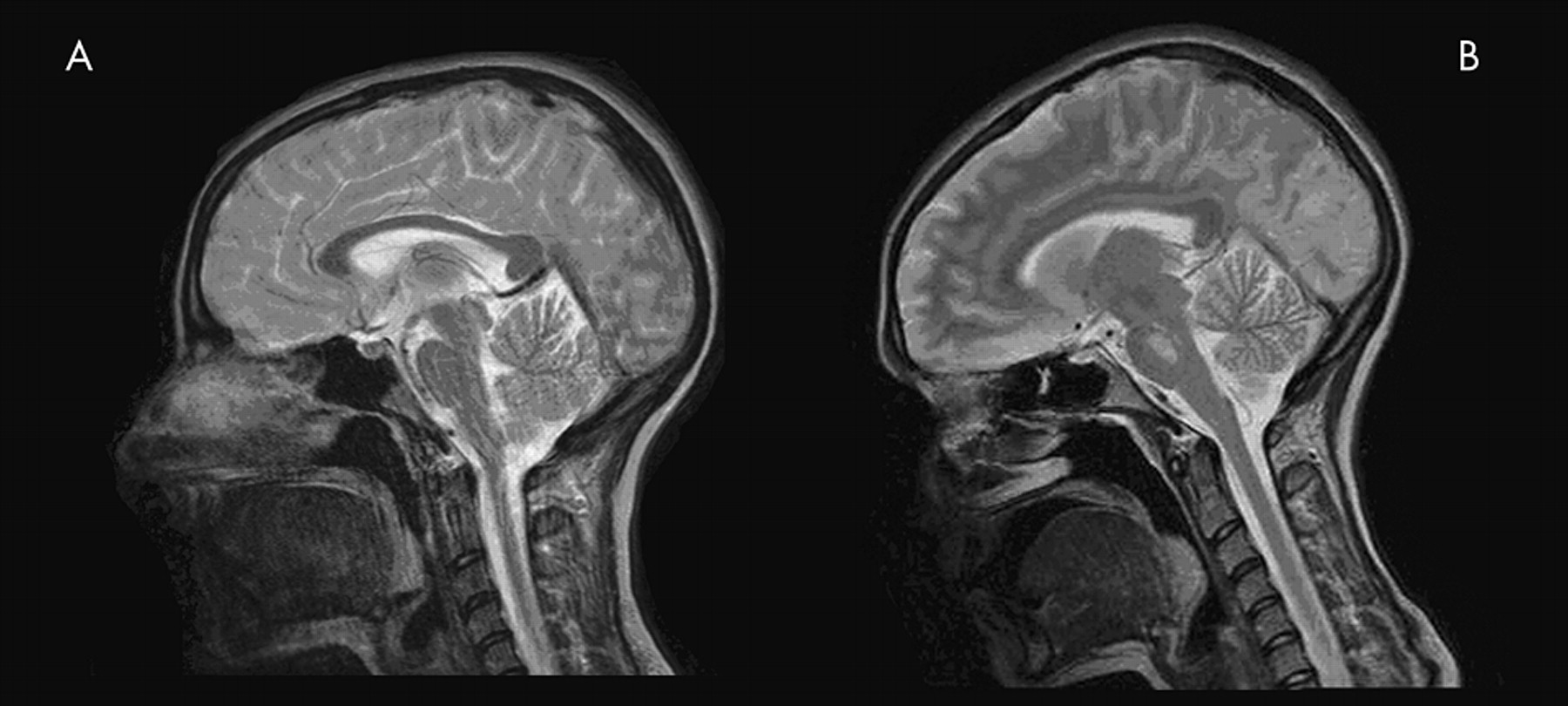To the Editor: Refeeding syndrome has been defined as a severe electrolyte and fluid shift associated with metabolic abnormalities in patients with malnutrition undergoing realimentation, whether orally, enterally, or parenterally.
1 In psychiatry, refeeding syndrome occurs in people with eating disorders and alcoholism.
2 The consequences of missing a diagnosis of refeeding syndrome can be fatal; neurological complications include the Wernike-Korsakov syndrome
1 and central pontine myelinolysis.
Central pontine myelinolysis is a rare neurological disorder defined by symmetric demyelination of the central base of the pons. The most common cause is rapid correction of hyponatremia. Understanding the pathogenesis of central pontine myelinolysis is improving,
3 however, the evolution of the disorder can make it difficult to diagnose clinically. The initial symptoms of myelinolysis can begin to appear 2 to 3 days after hyponatremia is corrected, and include a depressed level of awareness, difficulty speaking (dysarthria or mutism), and dysphagia. Additional symptoms often arise over the next 1–2 weeks including impaired thinking, weakness, paralysis in the arms and legs, stiffness, impaired sensation, and difficulty with coordination. At its most severe, myelinolysis can lead to coma, “locked-in” syndrome, and death.
4Central pontine myelinolysis occurring in people with anorexia nervosa has already been reported as a direct consequence of the behaviors associated with it.
5 –
11 We report a case of central pontine myelinolysis in a 23-year-old woman with a 7-year history of anorexia nervosa which not only further highlights the occurrence of this complication in this high risk group of people, but also illustrates several other issues pertinent to today’s liaison psychiatrist.
Case Report Initial Presentation (Day 1)
A 23-year-old Caucasian woman presented to the Accident and Emergency department having been discovered unresponsive in her bed by her mother. Prior to this she had been unwell for 2 weeks with vomiting and flu-like symptoms and her general practitioner had diagnosed a viral illness. In the Accident and Emergency department she had two tonic-clonic seizures and Glasgow Coma Scale was reported to be 8/15. Initial investigations showed sodium levels of 108 mmol/liter, potassium at 1.6 mmol/liter, and pH at 7.62. A CT scan of the head was normal. Neurological examination and further investigations, including magnetic resonance imaging (MRI) and lumbar puncture, showed no abnormality, and a diagnosis of hypokalemic alkalosis secondary to vomiting was made with secondary seizures due to the metabolic disturbance.
Initial management included intubation and ventilation, intravenous fluids and transfer to Intensive Therapy Unit (ITU). It had been noted though that on transfer to ITU there had been a rapid correction of her electrolytes in a 12-hour period, with sodium shifting from 108 mmol/liter to 130 mmol/liter and potassium from 1.6 mmol/liter to 3.8 mmol/liter.
The patient had a 7-year history of anorexia nervosa. She had an admission to an eating disorders unit at age 21 for a 3-month period. Following discharge, she remained stable with her BMI ranging between 20 and 21. A few weeks prior to admission to the general hospital she had consulted her general practitioner after a worsening of her anorexia nervosa, at which point her BMI was 16.4.
Progress in ITU (Days 2–5)
After 24 hours, the patient began to make progress with an improving GCS. At the time of her discharge from ITU (day 5), she had a neurological examination which was largely normal except for some slowing of speech, though she showed no aphasia; her sodium level was 132 mmol/liter and potassium 4.4 mmol/liter.
Progress on the General Medical Ward (Days 6–9)
Following transfer to the general medical ward, the patient was walking on day 6 but having word-finding difficulties. On day 7 she appeared occasionally confused and on day 8 she had worsening mobility—her feet dragged and she was unable to walk to the toilet. On day 9 she was found on the floor after a fall and was noted by nursing staff to be exhibiting “child like behavior.” Her urea and electrolytes during this period were normal. A neurological consultation was sought and a repeat MRI showed no abnormality (see
Figure 1, left side). Taking into account the patient’s past psychiatric history, normal MRI, urea, and electrolytes, and her earlier ability to walk, it was concluded that her weakness and speech difficulty were functional.
Progress on the General Medical Ward (Days 10–17)
The patient continued to deteriorate, eventually becoming bed-bound. She had difficulty swallowing oral medication and her speech became incomprehensible. Her meals were left by the bedside and her inability to eat was seen as purposeful. It was believed she was refusing food as part of her eating disorder and therefore an urgent psychiatric review was requested.
On the first psychiatric assessment on day 15, the patient presented with mutism. Prior to admission, the family had no concerns regarding the patient’s mental health, and they expressed surprise at the medical team’s suggestion that she was purposefully refusing to eat. There was discussion about the use of the England and Wales Mental Health Act 1983, due to the possible need for nasogastric tube feeding if the situation continued to deteriorate. Further psychiatric assessment on day 17 found the patient to be worse, with a Glasgow Coma Scale of 10. Urgent neurological consultation was again sought.
On further neurological examination there were clear signs of an organic disorder with upper motor neuron signs throughout. A repeat MRI highly suggested central pontine myelinolysis (see
Figure 1, right side). The patient was transferred to the neurological ward for treatment and ongoing rehabilitation. Her progress continues with slow improvement in mobility and responses.
Discussion
This case highlights not only a rare complication of refeeding syndrome but also a number of important issues relevant to the liaison psychiatrist which are worthy of further discussion. These include:
1. The need for awareness of the possibility of refeeding syndrome in high risk patients;
2. The importance of good communication between various specialties and the need for liaison psychiatry and medical teams to work closely together;
3. The diagnostic challenges of disorders that exhibit both neurological and psychiatric symptoms;
4. Medical staff attitudes and preconceptions of patients with mental health diagnoses.
Prior to hospital admission the patient lost weight and had a viral-like illness which caused vomiting and she was at particularly high risk for complications such as severe electrolyte disturbance and its sequelae. It is clear that the cause of the development of central pontine myelinolysis was most likely secondary to rapid correction of her electrolytes, which had originally been acknowledged but not effectively communicated to the general medical team from Intensive Therapy Unit. Better awareness of this in the hospital staff could be facilitated by education about the risks of refeeding syndrome by liaison psychiatrists.
The gradual change in the patient’s presentation (as is the case in central pontine myelinolysis), and her previous history of anorexia nervosa along with an initial normal MRI, made the pursuit of an organic cause less appealing. There was an overlap in symptomology of a neurological or psychiatric origin making diagnosis difficult, and so the patient was thought to be purposefully behaving in a manner that eventually alerted her to the attention of the liaison psychiatric services.
Attribution theory from the field of social psychology, as first described by Heider,
12 can explain the subsequent course that was seen. Once it was “believed” to be a functional problem, the attitude of staff was altered such they exhibited a “fundamental attribution error”—an unjustified tendency to assume that a person’s actions depend on what “kind” of person he or she is rather than on the social and environmental forces at work. This not only delayed the diagnosis but also, to some extent, affected the initial psychiatric assessment with an acceptance of a functional problem and consideration of the use of the Mental Health Act.
Conclusion
As in similar case reports, we illustrate the potential pitfalls in the prevention, diagnosis, and management of the complications of refeeding syndrome in patients with mental illness who are malnourished as a consequence. We have also tried to demonstrate that to deliver effective liaison psychiatry services to a general hospital, one should be thorough when reviewing medical notes, communicate with all relevant professionals, and obtain collaborative history when possible from all sources, including the family and friends of the patient. One should also be aware that the stigma of mental illness will need to be counteracted to some degree with education, and how this stigma can also indirectly influence even our own clinical judgments.


